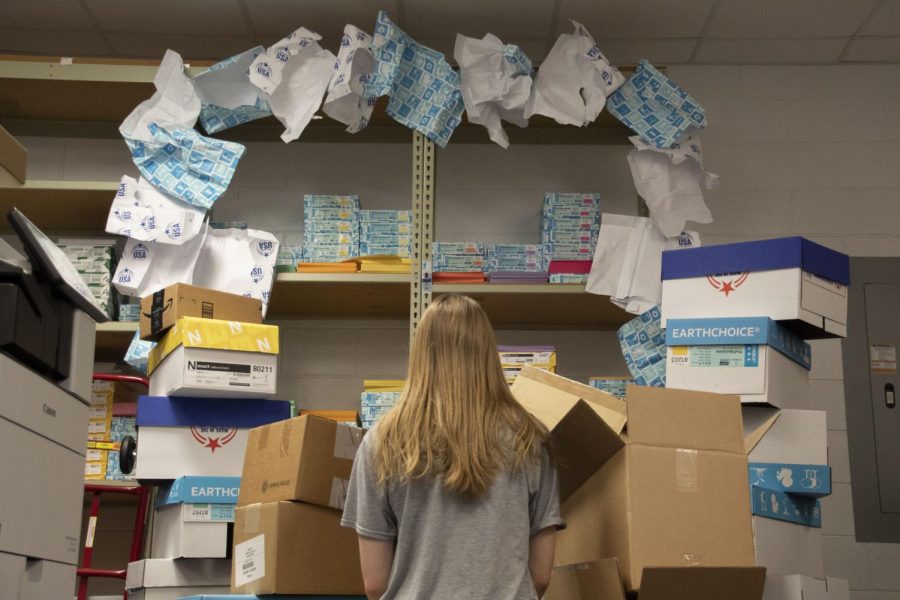Paper usage at South proves excessive
Surrounded by reams of paper, a student feels distressed about the amount of paper used daily here at South. Each day, the school uses 67,516 pieces of paper, of which 45,000 are printed in South’s print shop.
February 14, 2020
67,516. Approximately 67,516 sheets of paper are used every day at south, according to data collected by The Oracle.
Approximately 45,000 sheets of paper from the print shop, according to printer Frank Armea.
11,340 sheets of loose leaf paper, if every student and staff member used three sheets a day.
11,176 sheets of paper each day for all individual printers, copiers, scanners, and faxers. This is an approximation based on data from PaperCut MF, a software program that tracks the amount of sheets used throughout the district.
Numbers do not include individual printers students used to print their assignments at home, the Titan Nation and advertisement flyers hanging throughout the hallways, hall passes, sticky notes, food wrappers in the cafeteria, and so much more.
A single, average-sized tree makes 16.67 reams of copy paper, or 8,333.3 individual sheets, according to conservatree.org, an organization dedicated to educating the world on the impact of paper. Our school alone uses 8.1 trees every day, contributing to problems such as deforestation, the extinction of wildlife, and the emission of fossil fuels.
As an institution fostering the growth of a generation burdened with combating climate change, this waste is disgraceful. It is high time our school wakeup to its contribution towards the looming footprint squashing our beloved forests and do something to preserve our future.
The Oracle Editorial Board strongly urges the administration to implement regulations on the amount of paper students and staff print each day to promote the sustainability of the environment.
Although recycling paper is often viewed as a way of recompensing the mass use of paper, James Glynn, environmental science and chemistry teacher, asserts that the recycling system adapted by the world is not efficient.
“The global recycling system basically does not work” Glynn explained. “The global rate is 8.6 percent of all materials recycled. Most of these things will be recycled once and then that basically is the end of what can be done with it. [Recycling] is not really a myth, it is just not working. ”
Since recycling proves to make little impact in the reduction of paper waste and south doesn’t have an efficient, organized recycling system, according to Principal Dr. Lauren Fagel, the need to conserve the amount of paper our school uses is more urgent. It’s past time we stop using the lack of efficient recycling as an excuse. To take a well overdue stand, The Oracle editorial board has provided some strategies to conserve paper.
Since every student is provided a Chromebook from the school, using online resources in the education of students should be further promoted to reduce the use of paper. However, The Oracle editorial board acknowledges that students learn best when taking notes on paper, according to a study published in The Psychological Science Journal.
“Students do not learn as effectively on computers, and research constantly shows that it is not as effective for your brain” Glynn asserts. “Teachers aren’t going out of their way to waste paper. I think they are doing something they find the most effective for students. Look, we have tried digital stuff but kids do not always like it.”
While The Oracle editorial board agrees with Glynn, the current state of the environment proves too concerning to accept this reality and continue to consume more paper. There are sustainable supplies, such as the digital notebook, Rocketbook, that continue to provide the satisfaction and benefits of writing on paper that south could take advantage of.
The need to conserve paper to combat the effects of climate change goes beyond our empathetic obligations. South spends roughly $937.12 on paper each day. Through more conservation efforts, this cost may be lowered substantially.
We’re just a small school, in a small town, however in the grand scheme of things, we’ve got the whole world in our hands. It’s time we stop making excuses and save it.



